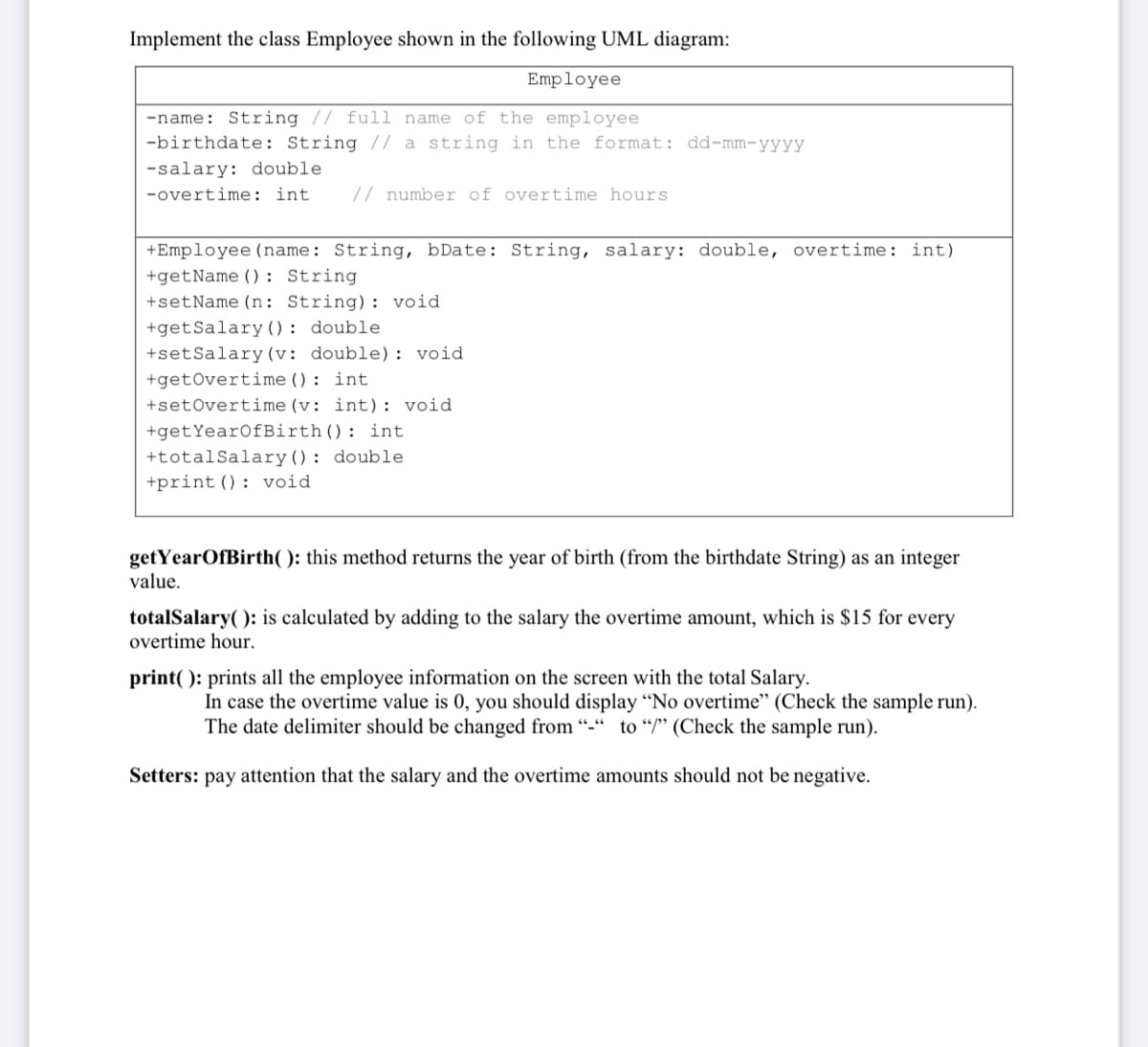Implement the class Employee shown in the following UML diagram: Employee -name: String // full name of the employee -birthdate: String // a string in the format: dd-mm-yyyy -salary: double -overtime: int // number of overtime hours +Employee (name: String, bDate: String, salary: double, overtime: int) +getName () : String +setName (n: String): void +getSalary (): double +setSalary (v: double): void +getOvertime (): int +setOvertime(v: int): void +getYearOfBirth(): int +totalSalary (): double +print (): void getYearOfBirth( ): this method returns the year of birth (from the birthdate String) as an integer value. totalSalary( ): is calculated by adding to the salary the overtime amount, which is $15 for every overtime hour. print( ): prints all the employee information on the screen with the total Salary. In case the overtime value is 0, you should display "No overtime" (Check the sample run). The date delimiter should be changed from "-“ to “/* (Check the sample run). Setters: pay attention that the salary and the overtime amounts should not be negative.
Implement the class Employee shown in the following UML diagram: Employee -name: String // full name of the employee -birthdate: String // a string in the format: dd-mm-yyyy -salary: double -overtime: int // number of overtime hours +Employee (name: String, bDate: String, salary: double, overtime: int) +getName () : String +setName (n: String): void +getSalary (): double +setSalary (v: double): void +getOvertime (): int +setOvertime(v: int): void +getYearOfBirth(): int +totalSalary (): double +print (): void getYearOfBirth( ): this method returns the year of birth (from the birthdate String) as an integer value. totalSalary( ): is calculated by adding to the salary the overtime amount, which is $15 for every overtime hour. print( ): prints all the employee information on the screen with the total Salary. In case the overtime value is 0, you should display "No overtime" (Check the sample run). The date delimiter should be changed from "-“ to “/* (Check the sample run). Setters: pay attention that the salary and the overtime amounts should not be negative.
C++ Programming: From Problem Analysis to Program Design
8th Edition
ISBN:9781337102087
Author:D. S. Malik
Publisher:D. S. Malik
Chapter13: Overloading And Templates
Section: Chapter Questions
Problem 20PE
Related questions
Question
What is the solution for this question?(using java language )

Transcribed Image Text:Implement the class Employee shown in the following UML diagram:
Employee
-name: String // full name of the employee
-birthdate: String // a string in the format: dd-mm-yyyy
-salary: double
-overtime: int
// number of overtime hours
+Employee (name: String, bDate: String, salary: double, overtime: int)
+getName () : String
+setName (n: String): void
+getSalary(): double
+setSalary (v: double): void
+getOvertime (): int
+setOvertime (v: int): void
+getYearOfBirth(): int
+totalSalary(): double
+print (): void
getYearOfBirth( ): this method returns the year of birth (from the birthdate String) as an integer
value.
totalSalary( ): is calculated by adding to the salary the overtime amount, which is $15 for every
overtime hour.
print( ): prints all the employee information on the screen with the total Salary.
In case the overtime value is 0, you should display “No overtime" (Check the sample run).
The date delimiter should be changed from "-" to "/" (Check the sample run).
Setters: pay attention that the salary and the overtime amounts should not be negative.
Expert Solution
This question has been solved!
Explore an expertly crafted, step-by-step solution for a thorough understanding of key concepts.
This is a popular solution!
Trending now
This is a popular solution!
Step by step
Solved in 4 steps with 3 images

Knowledge Booster
Learn more about
Need a deep-dive on the concept behind this application? Look no further. Learn more about this topic, computer-science and related others by exploring similar questions and additional content below.Recommended textbooks for you

C++ Programming: From Problem Analysis to Program…
Computer Science
ISBN:
9781337102087
Author:
D. S. Malik
Publisher:
Cengage Learning

C++ Programming: From Problem Analysis to Program…
Computer Science
ISBN:
9781337102087
Author:
D. S. Malik
Publisher:
Cengage Learning